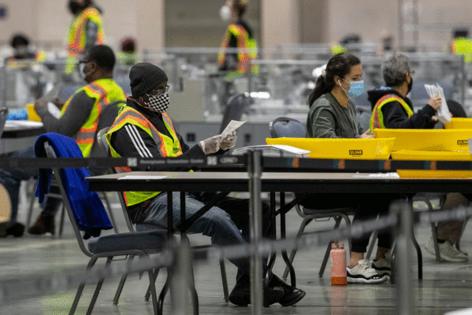Get ready to wait: Swing state officials say final results could take weeks to tally
Published in Political News
Several top elections officials from key swing states have indicated that voters will need to be patient this cycle, as it could take weeks for their teams to finish accurately counting the millions of ballots they expect will be cast in their jurisdictions.
Speaking Tuesday on a conference call organized by the Harvard Kennedy School’s Ash Center for Democratic Governance and Innovation, the secretaries of state from Pennsylvania, Michigan, and Arizona, joined by the executive director of North Carolina’s State Board of Elections, spent an hour discussing the challenges that have arisen over the last decade surrounding elections.
Among those challenges will be getting through the count without error and with an impatient public waiting for results from the handful of battleground states which inevitably end up deciding who takes the White House.
Providing an accurate count, the elections officials said, will simply take time. How long?
“Thirteen days and we’re not doing it any sooner, because we’re going to get it right,” Arizona Secretary of State Adrian Fontes said. “What the media says is what they say; official results are official when we’re done with them.”
Pennsylvania Secretary of State Al Schmidt warned that when you “hear about delays in Pennsylvania” that those aren’t, in fact, delays.
“It’s not a delay at all. It takes time to count millions of votes, with integrity, especially when you can only start at 7 a.m. on election morning,” Schmidt said.
Karen Brinson-Bell, North Carolina’s top elections official, said that her state allows poll workers to start counting some ballots much sooner than some other states — some early votes are even being tallied now, she said. Voters in the Tar Heel state learned the unofficial results of the 2020 election shortly past midnight following election day.
“We’re aiming for that again. If we can do that through a pandemic, hopefully we can do it through all of the other changes we’re experiencing,” she said.
However, Brinson-Bell said those unofficial results won’t be certified by individual counties until November 15 — 10 days after the election — and then officially certified by the full State Board of Elections on the 26th.
“We don’t use the internet, we don’t load them, so getting results to a county Board of Elections or any kind central place, doesn’t happen instantaneously. This is not Cup-o-Noodle,” she said.
Michigan Secretary of State Jocelyn Benson said her constituents knew the unofficial results of the 2020 election within 24 hours. She hopes that is the case again this year, but did not say how long official results might take.
“The bottom line is, we’re all going to be working to — in a transparent, clear, and efficient way — tabulate every valid vote and only valid votes,” she said.
Getting the job done means getting it right the first time, according to Fontes, even in the face of unfounded theories of fraud or illegitimacy.
“We are charged with a specific task. And that is an enormous undertaking, and we have to make sure we get the fundamentals right,” he said.
When elections officials do that, he said, “we can continue to fight back against the lies and the conspiracy theories and the nonsense.”
Despite doubts about the security of the separate states’ elections systems being frequently broadcast loudly by some, according to Schmidt, U.S. elections “have never been more safe or more secure, period,” than they are today.
“That’s a fact,” he said. “Undoubtedly, the megaphone of people spreading mis- and disinformation is a lot louder than some of ours, certainly a lot louder than mine at the Pennsylvania Department of State. But, we have got to do what we can to always tell the truth in the face of all these lies seeking to undermine confidence in the results, seeking to prevent voters from casting their vote, and have the counted.”
Tuesday’s conversation was moderated by Harvard’s Winthrop Laflin McCormack Professor of Citizenship and Self-Government, Archon Fung, who also serves as the Director of the Ash Center.
According to the Center, among their reasons for hosting these swing-state officials, is that “the vote margins in these states are expected to be small, and some people are already questioning the election’s integrity.”
_____
©2024 MediaNews Group, Inc. Visit at bostonherald.com. Distributed by Tribune Content Agency, LLC.




























































Comments